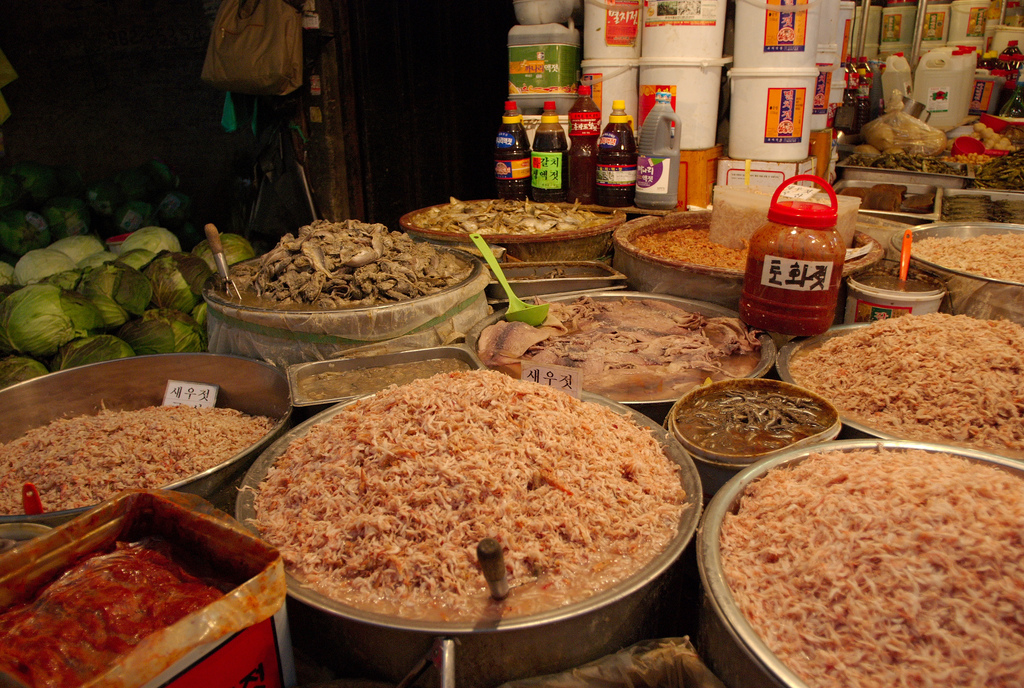- Jeotgal
Infobox Korean name

caption="Saeujeot " in the front and various jeotgal being sold atGyeongdong Market , Seoul.
hangul=젓갈 "or" 젓
hanja=none
rr=Jeotgal "or" Jeot
mr=Chŏtkal "or" Chŏt|"Jeotgal" or "jeot" (pronounced|ʨʌtgal) is a salted fermented food in
Korean cuisine . It is made with various seafood, such as shrimp, oysters,shellfish , fish, fish eggs, and fish intestines.Jeotgal is mainly used as a
condiment in picklingkimchi and as a dipping sauce for pig's feet ("jokbal ") and blood/noodle sausage ("sundae"). Sometimes "jeotgal", commonly "saeujeot", is added to Korean style stews ("jjigae ") and soups ("guk" and "tang"), for flavor instead of using salt or soy sauce (ganjang).The types of "jeotgal" vary depending on main ingredients, regions, and family and personal preferences. In past times, due to the limited transportation, regions near seas had more types of "jeot" compared to the inland areas.
History
"I-a" (爾雅), a Chinese book written in the 3rd-5th centuries BC, has a record on "ji" (鮨), the origin of "jeotgal". "Ji" indicates "jeotgal", food made with fish and is the oldest documents mentioning this food in the historical records.
Types
*
Saeujeot - jeot made with smallshrimp (saeu, 새우)
**Ojeot (오젓) - saeujeot made with shrimp harvested in May
**Yukjeot (육젓) - saeujeot made with shrimp harvested in June
**Tohajeot (토하젓) - jeot made with smallfresh water shrimp, which is rare local specialty ofJeolla Province
*Hwangsaegijeot (황새기젓) - jeot made with fish
*Myeolchijeot - jeot made withanchovies (myeolchi, 멸치)
*Jogijeot - jeot made withcroaker (jogi, 조기)
*Jogaejeot (조개젓) - jeot made withshellfish
*Guljeot (굴젓) - jeot made withoyster (gul, 굴)
*Eoriguljeot (어리굴젓) - jeot made with saltedoysters (gul, 굴) and hot peppers
*Myeongnanjeot (명란젓) - jeot made with roe (ran, 란) ofpollock (myeongtae, 명태)
*Changnanjeot (창란젓) - jeot made with pollock intestines
*Ojingeojeot (오징어젓) - Jeot made withsquid (ojingeo, 오징어)
*Ggolddugijeot (꼴뚜기젓) - jeot made with small squid
*Gejang - jeot made with crabsGallery
External links
* [http://www.visitseoul.net/english_new/eat/cen_jeotggal.htm Information about Jeotgal]
*ko icon [http://www.kwangcheon.com/contents-35.htm General information and history of "Jeotgal"]
*ko icon [http://gblog.gcomin.co.kr/bjjang/index.php/150004 Information about "Jeotgal"]
*ko icon [http://www.yescall.com/faithfish/page03.html General information and history of "Jeotgal"]
Wikimedia Foundation. 2010.
